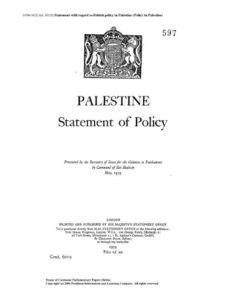Palestine: Statement of Policy by His Majesty’s Government in the United Kingdom (Cmd. 3692) – October 1930: Summary
Click here to view the complete document.
Introductory Statements, pp. 3-11
“…in the peculiar circumstances of Palestine no policy, however enlightened or however vigorously prosecuted, can hope for success, unless it is supported not merely by the acceptance, but by the willing cooperation of the communities for whose benefit it is designed.” p. 4
“Many of the misunderstandings which have unhappily arisen on both sides appear to be the result of a failure to appreciate the nature of the duty imposed upon His Majesty’s Government by the terms of the Mandate…in the words of the Prime Minister’s statement in the House of Commons on the 3rd April last, ‘a double undertaking is involved, to the Jewish people on the one hand and to the non-Jewish population of Palestine on the other.’” p. 4
“It must be realised…that it is useless for Jewish leaders on the one hand to press His Majesty’s Government to conform their policy in regard….to immigration and land to the aspirations of the more uncompromising sections of Zionist opinion…On the other hand, it is equally useless for Arab leaders to maintain their demands for a form of Constitution, which would render it impossible…to carry out…the double undertaking already referred to…It becomes, therefore, essential that at the outset His Majesty’s Government should make it clear that they will not be moved, by any pressure or threats, from the path laid down in the Mandate, and from the pursuit of a policy which aims at promoting the interests of the inhabitants of Palestine, both Arabs and Jews, in a manner which shall be consistent with the obligations which the Mandate imposes.” p. 5
“However difficult the task may be, it would…be impossible, consistently with the plain intention of the Mandate, to attempt to solve the problem by subordinating one of these obligations to the other.” p. 11
Security, p. 12
Constitutional Development, pp. 12-15
-History of Constitutional Development in Palestine – 1920-1930, pp. 13-14
-Establishment of Legislative Council, pp. 14-15
Economic and Social Development, pp. 15-23
-Land, pp. 16-18
“It can now be definitely stated that at the present time and with the present methods of Arab cultivation there remains no margin of land available for agricultural settlement by new immigrants, with the exception of such undeveloped land as the various Jewish agencies hold in reserve.” p. 16
-Agricultural Development, pp. 18-19
“…His Majesty’s Government are satisfied that…a more methodical agricultural development is called for with the object of ensuring better use of the land. Only by the adoption of such a policy will additional Jewish agricultural settlement be possible consistently with the conditions laid down in Article 6 of the Mandate…Transfers on land will be permitted only in so far as they do not interfere with the plans of…the Palestine Administration.” pp. 18-19
-Immigration, pp. 19-23
“…in the month of May it was considered necessary by His Majesty’s Government, whilst leaving undisturbed Jewish immigration in its various other forms, to suspend the further issue of certificates for the admission of immigrants under the Labour Schedule…for the half year ending the 30th September, 1930, pending the result of this examination…” pp. 19-20
“Clearly, if immigration of Jews results in preventing the Arab population from obtaining the work necessary for its maintenance, or if Jewish unemployment unfavourably affects the general labour position, it is the duty of the Mandatory Power under the Mandate to reduce, or…suspend such immigration until the unemployed portion…is in a position to obtain work.” p. 21
Conclusion, p. 22
“The situation revealed by exhaustive examination of the various…factors involved makes it clear that Palestine has reached a critical moment in its development. In the past it may be said that the Government has left economic and social forces to operate with the minimum of interference or control, but it has become increasingly clear that such a policy can no longer continue. It is only the closest cooperation between the Government and the leaders of the Arab and Jewish communities that can prevent Palestine form drifting into a situation which would imperil, on the one hand, the devoted work of those who have sought to build up the Jewish National Home, and, on the other, the interests of the majority of the population who at present possess few resources of their own…” p. 22




